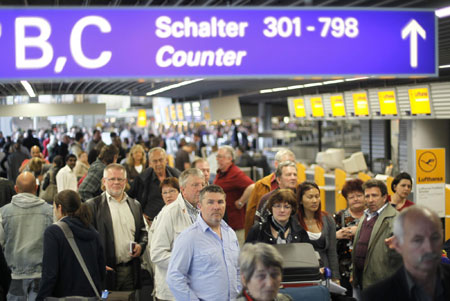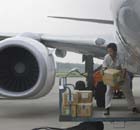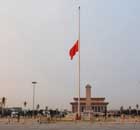Global General
European skies open but airline schedules scrambled
(Agencies)
Updated: 2010-04-22 03:38
 |
Large Medium Small |
FRANKFURT – Europe's skies were open for business on Wednesday but, with so many planes having been grounded by the volcanic ash from Iceland, it could take days or even weeks to clear the backlog.
|
 Passengers wait for their flights at the partially closed Frankfurt airport April 21, 2010. [Agencies]
|
About 75 percent of flights in Europe will operate on Wednesday, some 21,000 of the 28,000 flights normally scheduled each day, European air traffic agency Eurocontrol said.
"The major barrier to resuming flight has been understanding tolerance levels of aircraft to ash. Manufacturers have now agreed increased tolerance levels in low ash density areas," CAA head Deidre Hutton said.
"A return to normal will take another 48 hours," French junior Transport Minister Dominique Bussereau predicted. "I think the situation will be normal before the weekend."
Britain had lagged behind its European neighbors in downgrading the threat to airplanes from the ash, which can potentially scour and even paralyze jet engines.
In 1982, a British Airways jet lost power in all four engines after flying through an ash cloud over the Indian Ocean.
With aircraft having flown successful test flights for several days, recriminations have begun over why governments took so long to give the green light to the aviation industry, which the International Air Transport Association (IATA) says has lost some $1.7 billion in revenues.
"For an industry that lost $9.4 billion last year and was forecast to lose a further $2.8 billion in 2010, this crisis is devastating," IATA Director General and Chief Executive Giovanni Bisignani said in a statement on Wednesday.
He urged governments to examine ways to compensate airlines.
"It is an extraordinary situation exaggerated with a poor decision-making process by national governments," he said.
"Shambles"
The two biggest travel companies in Europe, Thomas Cook and TUI Travel issued a joint statement criticizing the British government's response to the volcano.
"The government's response to the crisis has been a shambles," said TUI Travel Chief Executive Peter Long.
"It is clear that they underestimated the severity of the consequences of the decision for a blanket closure of the airspace for such a protracted period of time."
But Henri Goudru, a UN scientific adviser who has studied volcanic eruptions for 40 years, defended the closures.










